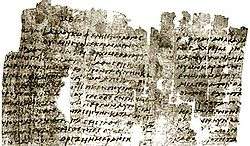Hebrews 7
| Hebrews 7 | |
|---|---|
|
Epistle to the Hebrews 2:14-5:5; 10:8-22; 10:29-11:13; 11:28-12:17 in Papyrus 13 (AD. 225-250). | |
| Book | Epistle to the Hebrews |
| Bible part | New Testament |
| Order in the Bible part | 19 |
| Category | General epistles |
Hebrews 7 is the seventh chapter of the Epistle to the Hebrews in the New Testament of the Christian Bible.[1][2] The name of the author is unknown, but it is a man and a friend of Saint Timothy based on the text in this book.[3][4]
Text
- The original text is written in Koine Greek.
- Some of the oldest manuscripts containing this chapter are:
- Codex Vaticanus (AD 325-350)
- Codex Sinaiticus (AD 330-360)
- Codex Alexandrinus (ca. AD 400-440)
- Codex Ephraemi Rescriptus (~AD 450; extant: verse 1-25)
- Codex Freerianus (~AD 450; extant: verse 1-2, 7-11, 18-20, 27-28)
- Codex Claromontanus (~AD 550)
- This chapter is divided into 28 verses.
Structure
This chapter can be grouped (with cross references to other parts of the Bible):
- Hebrews 7:1-10 = The King of Righteousness
- Hebrews 7:11-19 = A Better Estimate
- Hebrews 7:20-28 = Greatness of the New Priest
Cross references
Verse 1
- For this Melchizedek, king of Salem, priest of the Most High God, who met Abraham returning from the slaughter of the kings and blessed him,[5]
Verse 2
- to whom also Abraham gave a tenth part of all, first being translated “king of righteousness,” and then also king of Salem, meaning “king of peace,”[6]
Verse 3
- [For this Melchizedek] without father, without mother, without genealogy, having neither beginning of days nor end of life, but made like the Son of God, remains a priest continually.[7]
Verse 4
- Now consider how great this man was, to whom even the patriarch Abraham gave a tenth of the spoils.[8]
Verse 9
Verse 14
- For it is evident that our Lord arose from Judah, of which tribe Moses spoke nothing concerning priesthood.[10]
Verse 22
See also
- Abraham
- High priest
- Jesus Christ
- Judah (biblical person)
- Levi
- Melchizedek
- Moses
- Other related Bible parts: Genesis 14, Genesis 21, Genesis 22, Leviticus 16, Numbers 23, Psalm 110, Isaiah 55
References
- ↑ Halley, Henry H. Halley's Bible Handbook: an abbreviated Bible commentary. 23rd edition. Zondervan Publishing House. 1962.
- ↑ Holman Illustrated Bible Handbook. Holman Bible Publishers, Nashville, Tennessee. 2012.
- ↑ Davids, Peter H (1982). I Howard Marshall and W Ward Gasque, ed. New International Greek Testament Commentary: The Epistle of James (Repr. ed.). Grand Rapids, Mich.: Eerdmans. ISBN 0802823882.
- ↑ Evans, Craig A (2005). Craig A Evans, ed. Bible Knowledge Background Commentary: John, Hebrews-Revelation. Colorado Springs, Colo.: Victor. ISBN 0781442281.
- ↑ Hebrews 7:1
- ↑ Hebrews 7:2
- ↑ Hebrews 7:3
- ↑ Hebrews 7:4
- ↑ Hebrews 7:9
- ↑ Hebrews 7:14
- ↑ Hebrews 7:22
- ↑ John Gill's Exposition of the Entire Bible - Hebrews 7:22
![]() This article incorporates text from a work in the public domain: Gill, John. Exposition of the Entire Bible (1746-1763).
This article incorporates text from a work in the public domain: Gill, John. Exposition of the Entire Bible (1746-1763).
External links
This article is issued from Wikipedia - version of the 5/12/2016. The text is available under the Creative Commons Attribution/Share Alike but additional terms may apply for the media files.
